The Intel Core i9-9980XE CPU Review: Refresh Until it Hertz
by Ian Cutress on November 13, 2018 9:00 AM ESTHEDT Performance: Web and Legacy Tests
While more the focus of low-end and small form factor systems, web-based benchmarks are notoriously difficult to standardize. Modern web browsers are frequently updated, with no recourse to disable those updates, and as such there is difficulty in keeping a common platform. The fast paced nature of browser development means that version numbers (and performance) can change from week to week. Despite this, web tests are often a good measure of user experience: a lot of what most office work is today revolves around web applications, particularly email and office apps, but also interfaces and development environments. Our web tests include some of the industry standard tests, as well as a few popular but older tests.
We have also included our legacy benchmarks in this section, representing a stack of older code for popular benchmarks.
All of our benchmark results can also be found in our benchmark engine, Bench.
WebXPRT 3: Modern Real-World Web Tasks, including AI
The company behind the XPRT test suites, Principled Technologies, has recently released the latest web-test, and rather than attach a year to the name have just called it ‘3’. This latest test (as we started the suite) has built upon and developed the ethos of previous tests: user interaction, office compute, graph generation, list sorting, HTML5, image manipulation, and even goes as far as some AI testing.
For our benchmark, we run the standard test which goes through the benchmark list seven times and provides a final result. We run this standard test four times, and take an average.
Users can access the WebXPRT test at http://principledtechnologies.com/benchmarkxprt/webxprt/
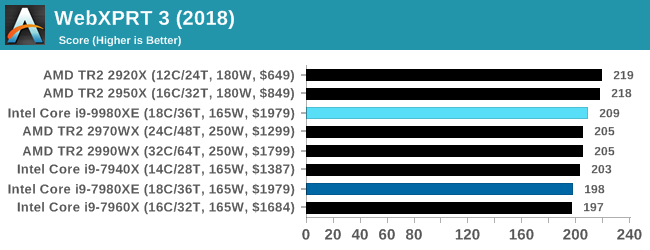
WebXPRT 2015: HTML5 and Javascript Web UX Testing
The older version of WebXPRT is the 2015 edition, which focuses on a slightly different set of web technologies and frameworks that are in use today. This is still a relevant test, especially for users interacting with not-the-latest web applications in the market, of which there are a lot. Web framework development is often very quick but with high turnover, meaning that frameworks are quickly developed, built-upon, used, and then developers move on to the next, and adjusting an application to a new framework is a difficult arduous task, especially with rapid development cycles. This leaves a lot of applications as ‘fixed-in-time’, and relevant to user experience for many years.
Similar to WebXPRT3, the main benchmark is a sectional run repeated seven times, with a final score. We repeat the whole thing four times, and average those final scores.
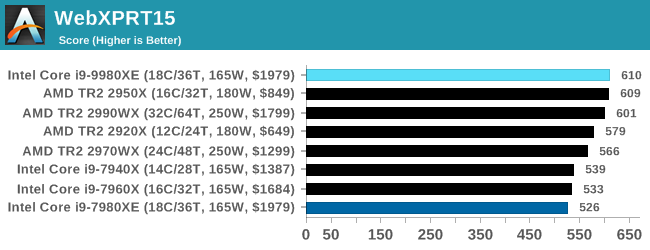
Speedometer 2: JavaScript Frameworks
Our newest web test is Speedometer 2, which is a accrued test over a series of javascript frameworks to do three simple things: built a list, enable each item in the list, and remove the list. All the frameworks implement the same visual cues, but obviously apply them from different coding angles.
Our test goes through the list of frameworks, and produces a final score indicative of ‘rpm’, one of the benchmarks internal metrics. We report this final score.
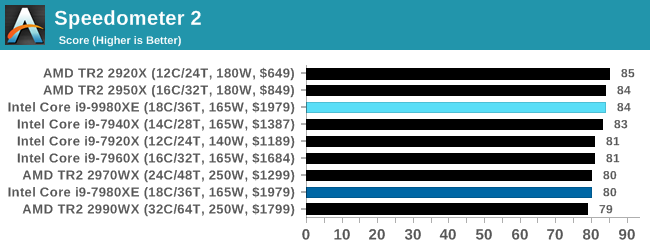
Google Octane 2.0: Core Web Compute
A popular web test for several years, but now no longer being updated, is Octane, developed by Google. Version 2.0 of the test performs the best part of two-dozen compute related tasks, such as regular expressions, cryptography, ray tracing, emulation, and Navier-Stokes physics calculations.
The test gives each sub-test a score and produces a geometric mean of the set as a final result. We run the full benchmark four times, and average the final results.
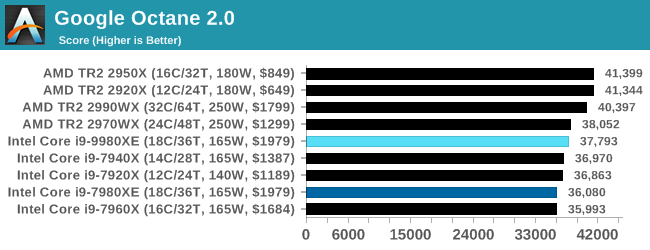
Mozilla Kraken 1.1: Core Web Compute
Even older than Octane is Kraken, this time developed by Mozilla. This is an older test that does similar computational mechanics, such as audio processing or image filtering. Kraken seems to produce a highly variable result depending on the browser version, as it is a test that is keenly optimized for.
The main benchmark runs through each of the sub-tests ten times and produces an average time to completion for each loop, given in milliseconds. We run the full benchmark four times and take an average of the time taken.
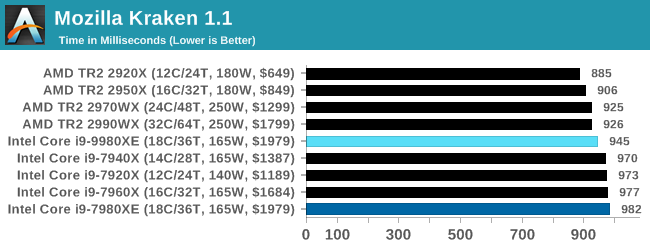
3DPM v1: Naïve Code Variant of 3DPM v2.1
The first legacy test in the suite is the first version of our 3DPM benchmark. This is the ultimate naïve version of the code, as if it was written by scientist with no knowledge of how computer hardware, compilers, or optimization works (which in fact, it was at the start). This represents a large body of scientific simulation out in the wild, where getting the answer is more important than it being fast (getting a result in 4 days is acceptable if it’s correct, rather than sending someone away for a year to learn to code and getting the result in 5 minutes).
In this version, the only real optimization was in the compiler flags (-O2, -fp:fast), compiling it in release mode, and enabling OpenMP in the main compute loops. The loops were not configured for function size, and one of the key slowdowns is false sharing in the cache. It also has long dependency chains based on the random number generation, which leads to relatively poor performance on specific compute microarchitectures.
3DPM v1 can be downloaded with our 3DPM v2 code here: 3DPMv2.1.rar (13.0 MB)
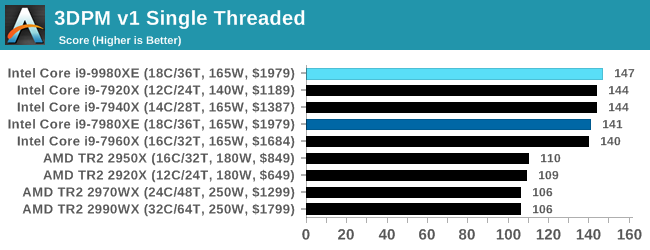
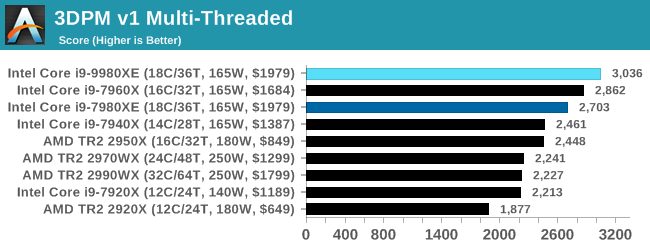
x264 HD 3.0: Older Transcode Test
This transcoding test is super old, and was used by Anand back in the day of Pentium 4 and Athlon II processors. Here a standardized 720p video is transcoded with a two-pass conversion, with the benchmark showing the frames-per-second of each pass. This benchmark is single-threaded, and between some micro-architectures we seem to actually hit an instructions-per-clock wall.
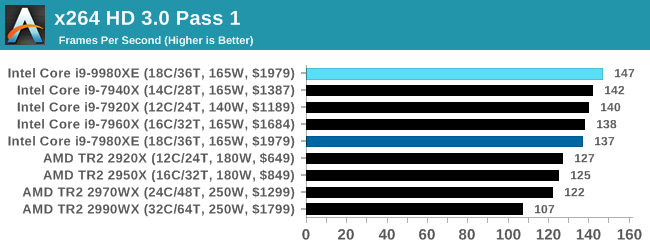
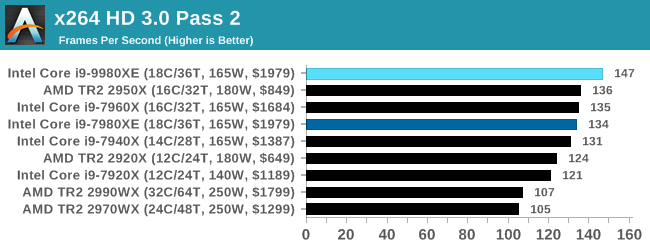










143 Comments
View All Comments
Stasinek - Wednesday, November 21, 2018 - link
It's indeed suprise to me that those new 24,32C AMD processors 2920,2970 are just worst in any therms than their 16C equivalents. In terms of perf/money perf/power just laughable.Linux changes a lot but who uses Linux and for what purpose?
I bet developers but what makes me really angry is that nobody even tries to use KVM, Xen, VirtualBox, VMware, VirtualBox as benchmarking tool for purpose of testing usage as small company server. In mine company lot of Remote Desktop sessions are connected to same server.
Someone would think - who needs good CPU? But it's only because dont used to solve real life problems and those problems are like importing big databases from obsolete programs, filtering, fixing and exporting to new ERP systems. This consumes lot of time to have fast CPU is crucial. Most of companies i know uses RDP server for that purpose and typical cheep portable laptops given to workers. To have AMD or Intel HDET tested in such purposes would be nice to see. Cause anyone can potencially have 32C anyone could benefit.. but rather than this kind test i used to see gaming.. gaming od HDET?! WTF
pandemonium - Wednesday, November 14, 2018 - link
All of these "my work doesn't have any desktop users" comments crack me up. Congratulations. Your work is not the entire world of computing in a professional space, much less prosumer space. Get over yourselves.halcyon - Wednesday, November 14, 2018 - link
@Ian CutressYour tests and review text are always a pleasure to read, thank you for the professionalism.
Questions related to the test suite (I know, everybody always wants something):
1. You are missing an Excel Spreadsheet calculation (Finance still uses a lot of these and they can peg all cores near 100% and be incredibly CPU dependent). Would be nice to see some for example an Excel Monte Carlo simulation kn the suite (local data)
2. Alternatively an R (language) based test for heavy statistical computation. Finding a one that is representative of real world workloads and strikes a balance between single core IPC and many core parallelisation might take some work. But this is one area where laptops just can't muster it and CUDA/OpenCL acceleration isn't often available at all.
3. For Web / JS framework it is nice to see SpeedoMeter and WebXPRT3, but for some reason V8 Web Tooling Bench is not there (https://v8.github.io/web-tooling-benchmark/ ). The old Kraken/JetStream/Octane are nice for reference, but not very representative of real world anymore for some time now (hence why they are abandoned).
Again thank you for this monumental work, the amount of tests is already superb!
For graphing results it would be so helpful to get a comparative price/perf graphed results browser (pick your baseline CPU, pick workloads, cpus on graph as a func of price/perf). This would enable auick viewinf of the efficient frontier in terms of price/perf for each workload and see the base CPU as an anchor.
Yeah, yeah, I know.... Just throwing this in here 😀
KAlmquist - Wednesday, November 14, 2018 - link
These benchmarks also show the 16 core TR 2950X beating the 18 core i9-9980XE in some cases.KAlmquist - Wednesday, November 14, 2018 - link
My previous comment was a reply to nexuspie's observation that, "These benchmarks show that the 9980's 18 cores often BEAT the 2990wx's 32 cores."Stasinek - Wednesday, November 21, 2018 - link
Witch should lead to conlcusion AMD Threadripper 2 is just bad offer except 2950.It's the one and only AMD CPU worh mentioning - witch means TR4 16C is dead end.
AMD offers overpriced CPUs on that platform that is for sure.
Overpriced because half of cores are choking being absolute useless.
If 32C and 4 channels is too much cores/channel imagine RYEN 3 16C on dual channel..
It will be big dissapointment for some people i bet.
Regardless of pricing Intel 9980 is just great.
Stasinek - Wednesday, November 21, 2018 - link
Is that what you wanted to say?crotach - Wednesday, November 14, 2018 - link
I have to say I'm a big fan of HEDT platforms, I built my last workstation in 2011 and it still serves me well 7 years later. But looking at this and the X299 offering I really don't see why anyone would bother.Lolimaster - Thursday, November 15, 2018 - link
Till intel changes the way it builds high core count cpu's they can't compete with AMD and it will be even worse next year when AMD made an already cheaper way to produce high core count cpu's even cheaper, to sick levels.Gasaraki88 - Thursday, November 15, 2018 - link
I'm actually more interested in the i7-9800X vs. the i9-9900K. I want to see how the overclocking is compared to the i9-9900K before I just in to X299.